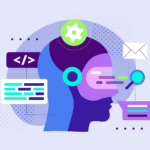What does the future hold for AI in e-learning ?

The All-Encompassing AI
AI is the product of an age where everything is changing – and changing fast- it’s easy to forget how much we’ve progressed. We are reaching a new tipping point in the development of computers to allow us to completely unlock a new set of use cases.
We have personal assistants like Siri, Cortana, Google now whom we can ask more sophisticated questions like show photographs from the august trip, book a cab on Uber, pay phone bill from Myairtel app, etc. The future has already arrived and we are on the brink of some very exciting and dramatic developments across all industries.
How many travel agents do you need when your assistant can book a flight for you? How many customer support agents do we need when we can use machine learning to extract answers from thousands of pages? How many employees do we still need in a back office of a bank or insurance company who are making decisions which soon can also be potentially automated? With the growth and popularity of the internet, online systems are becoming more and more effective.
Artificial Intelligence (AI) has drawn the attention of many people in the online learning world, and interest in this fast growing trend is not going to subside in 2017. Artificial Intelligence has unimaginable potential and it has quietly crept into many facets of our lives. Within the next couple of years, AI will revolutionize every area of our life, including e-learning.
The goal of the field is to deliver computer based systems which can be used in real teaching, learning and training situations. Using AI concepts and techniques new forms of intelligent e-learning platform can be created that allow the computer to act as an intelligent learner/ tutor. Such AI based intelligent system can provide a personalized tutorial to the student based on his/her knowledge, experience, strengths, and weaknesses.
The current era of educational studies is highly associated with developments and improvements in the digital world and has an important role in shaping the function of education in improving teaching and learning experiences.
Learning depends on the experiences we present to the learners. This article will present a broad, nontechnical overview and several examples of how AI-enhanced e-learning will change the way we teach and learn. Presenting 3 Scenarios how AI can impact Elearning.
How can AI impact E-learning?
1. Real-time Querying
Messaging is the most direct way for students to communicate. Students who get doubts with some concepts of a course can upload their questions in real time into the e-learning service, and an artificial intelligent system will read through the queries of the student and answer them in real time. Artificial Intelligence system can also impart reasoning and advising or provide explanation and advice to students.
With AI enabled e-learning platform, the students can also type instructions to an assistant such as, “I have a quiz tomorrow on the topic Big data analytics, Get me all the resources related to big data analytics”. The AI assistant will pull out all the resources related to big data and present it to the user. The assistant can process requests that would otherwise be time-consuming and would require several steps.
The messaging interface is an effective way to help students get more out of the e-learning course provider.
2. Gamification
AI plays a crucial role in designing strategic games for e-learning content. In order to properly and effectively add gamification to your courses, the game elements need to be thoroughly thought out and well designed. It is very important to set up a relevant content in gaming simulation for higher retention and course completion. Students will be more motivated and interested in learning in a gaming scenario.
3. Language Processing
It is possible for the students to interact with an artificial intelligent system that understands the natural language spoken by them. Intelligent systems are capable of hearing and comprehending the language in terms of sentences and their meanings while a student talks to it. It can handle different accents, different languages, noise in the background, change in human’s noise, etc.
How to design an experience around Artificial Intelligence?
The experience with the AI should be carved with several goals in mind. The designers should know that they need to study human behavior if they want to create a right experience utilizing AI.
The most important of all the design facets is Emotion. Emotion is the fine line which separates computer interaction from human interaction. We should design some personality into an AI that mimics emotion enough to create a more engrossing experience because learning is an emotional process where there is the happiness of gaining new knowledge.
Designers should establish active, emotionally aware relationship between a student and the e-learning platform. The experience should be more about responding to the needs the students haven’t expressed yet, like for example AI assistants should edit a student’s tutoring plan based on their attention span and interest level.
The happiness level of interaction with well designed AI will be high. The AI will be engaging and it will also feel more lively and Real than a Bot.
When it is examined in the context of educational studies, artificial intelligence-based approaches are often preferred in order to develop more effective, advanced e-learning systems. Today, educational institutions often prefer designing artificial intelligence supported e-learning scenarios and are applying them in different courses or educational activities in order to improve teaching and learning experiences.
AI & future of E-learning
AI will shape e-learning technology, allowing us to escape from the traditional teaching paradigm of flat and linear learning. Artificial Intelligence technology is well on its way to becoming ubiquitous and has huge scope to enhance technology at many levels, leading to much better and faster outcomes.
While robots and computers will probably never completely replace teachers and tutors, but AI will transform the learning industry changing the way teachers think about providing education.
Do you think the Artificial Intelligence trend in e-learning will catch on? What yet untapped opportunities do you see for AI in e-learning in the years to come? Share with us your thoughts in the comments section below


